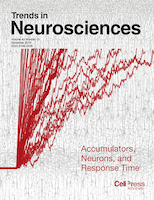
REVIEWS IN THE NEUROSCIENCES
metrics 2024
Connecting Ideas, Inspiring Discoveries
Introduction
REVIEWS IN THE NEUROSCIENCES is a prestigious peer-reviewed journal published by Walter de Gruyter GmbH, specializing in the multidisciplinary field of neuroscience. With a robust history dating back to 1986 and a converged publishing timeline through to 2024, this journal serves as an essential platform for researchers and professionals who seek to explore the complexities of neuroscience in a rapidly evolving landscape. The journal is currently indexed in Scopus, boasting an impressive rank of #19 out of 113 in the General Neuroscience category, positioning it in the 83rd percentile of academic journals. It is classified within the Q2 quartile, reflecting its significant impact and contribution to the field. While not an Open Access publication, the journal offers extensive access options for institutions and individuals eager to stay informed about the latest findings and advancements in neuroscience. REVIEWS IN THE NEUROSCIENCES aims to provide comprehensive reviews covering a wide range of topics in neuroscience, fostering scholarly discussion and advancing knowledge, making it an invaluable resource for researchers, academics, and students alike.
Metrics 2024
 1.11
1.11 3.40
3.40 4.50
4.50 88
88Metrics History
Rank 2024
Scopus
IF (Web Of Science)
JCI (Web Of Science)
Quartile History
Similar Journals

INTERNATIONAL JOURNAL OF NEUROSCIENCE
Unraveling Complexities: Your Gateway to Neuroscience InsightsThe INTERNATIONAL JOURNAL OF NEUROSCIENCE, published by TAYLOR & FRANCIS LTD, stands as a vital resource in the field of neuroscience since its inception. With a proud history of publication from 1970 to 2024, this journal is committed to advancing knowledge in various domains of neuroscience, from fundamental research to clinical applications. It is indexed with an ISSN of 0020-7454 and an E-ISSN of 1563-5279, reflecting its wide reach and recognition. The journal maintains a respectable position in the academic landscape, categorized as Q2 in Medicine (miscellaneous) and Q3 in Neuroscience (miscellaneous) as of 2023, signifying its relevance among researchers and professionals. Although it currently does not offer open access, the journal remains a significant platform for disseminating groundbreaking research, thereby fostering collaboration and innovation within the neuroscience community. Located in the United Kingdom, the journal aims to bridge gaps in neuroscience knowledge, making it an essential reading for students, professionals, and researchers dedicated to unraveling the complexities of the nervous system.

BMC NEUROSCIENCE
Connecting Researchers to the Heart of Neuroscience DiscoveryBMC NEUROSCIENCE is a prominent open access journal dedicated to the dissemination of high-quality research within the dynamic and rapidly evolving field of neuroscience. Published by BMC, a well-respected leader in open access publishing, this journal facilitates the free exchange of knowledge since its inception in 2000. With the ISSN 1471-2202, BMC NEUROSCIENCE aims to address the diverse interests of the neuroscience community by covering a broad spectrum of topics, ranging from cellular and molecular neuroscience to general neurological studies, thus appealing to researchers, professionals, and students alike. Although it currently holds a Q4 ranking in Cellular and Molecular Neuroscience and a Q3 rank in miscellaneous Neuroscience categories, its commitment to advancing the understanding of brain function and disorders remains steadfast. The journal features a user-friendly Open Access model, ensuring that critical research findings are readily accessible to everyone, fostering collaboration and innovation in the field. As the journal continues to evolve towards its convergence years of 2024, it aspires to enhance its impact and global reach, making it a valuable resource for anyone interested in advancing neuroscience research.

Translational Neuroscience
Innovating the Future of Neurological Science.Translational Neuroscience, published by DE GRUYTER POLAND SP Z O O, is a leading open-access journal since its inception in 2015, dedicated to the multidisciplinary exploration of neurological research and its clinical applications. With an ISSN of 2081-3856 and an E-ISSN of 2081-6936, the journal serves as a crucial platform for scholars and practitioners to disseminate innovative findings and theoretical advancements in the field of neuroscience. Covering various aspects of general neuroscience, it is ranked in the Q3 quartile for 2023 and positioned at Rank #75 out of 113 in its category, reflecting its growing impact within the scientific community. The journal strives to bridge the gap between laboratory research and clinical practice, fostering collaboration among researchers, clinicians, and educators. The editorial team is committed to maintaining high publication standards that engage the audience with rigorous research while promoting a culture of open science. For those interested in the forefront of neuroscience research, Translational Neuroscience offers an invaluable resource for knowledge and innovation.

CELLULAR AND MOLECULAR NEUROBIOLOGY
Unlocking the Secrets of Cellular Mechanisms.CELLULAR AND MOLECULAR NEUROBIOLOGY, published by SPRINGER/PLENUM PUBLISHERS, stands as a significant contributor to the fields of cell biology and neuroscience, holding a distinguished position in the academic community with an impact factor that places it in the Q2 category for both Cell Biology and Cellular and Molecular Neuroscience, along with Q1 in Medicine (miscellaneous). Since its inception in 1981, this journal has provided a critical platform for innovative research and thought-provoking reviews, fostering a deeper understanding of complex neurobiological mechanisms. The journal’s rigorous peer-review process ensures the publication of high-quality manuscripts that offer valuable insights into cellular processes and neural functions. With a commitment to advancing knowledge and promoting collaboration among researchers, CELLULAR AND MOLECULAR NEUROBIOLOGY remains an essential resource for professionals and students alike, looking to stay updated on the latest developments in neurobiology.

Neurodegenerative Diseases
Connecting researchers to combat neurodegenerative challenges.Neurodegenerative Diseases, published by KARGER, is a prominent academic journal dedicated to advancing the field of neurology and neuroscience. With an ISSN of 1660-2854 and E-ISSN 1660-2862, this journal serves as a vital platform for researchers, professionals, and students engaged in the exploration of neurodegenerative disorders from various perspectives, including clinical applications and therapeutic interventions. Spanning two decades since its inception in 2004 and set to converge in 2024, it has steadily built a reputation within the academic community, achieving a commendable Q2 ranking in clinical neurology and Q3 in general neurology according to the 2023 category quartiles. The journal boasts an impressive Scopus rank of 114/400 (71st percentile) in clinical neurology and 58/192 (70th percentile) in neuroscience neurology. While not classified as open access, the publication provides critical insights into the latest research and developments, making it an essential resource for anyone dedicated to understanding and combating neurodegenerative diseases.

NEUROSCIENCE RESEARCH
Bridging Inquiry and Insight in NeuroscienceNEUROSCIENCE RESEARCH, published by Elsevier Ireland Ltd, is a leading journal in the field of neuroscience, with a notable reputation for disseminating high-quality research that spans a variety of topics within the discipline. With an ISSN of 0168-0102 and an E-ISSN of 1872-8111, this journal serves as a vital platform for both established researchers and emerging voices in the field. Ranking in the Q2 quartile in both Medicine and Neuroscience categories, it has been recognized as a reliable source of innovative findings since its inception in 1984, with continuous publication through 2024. Although it does not currently offer Open Access options, the journal is indexed in Scopus, holding a significant position at Rank #48/113 in General Neuroscience, reflecting its contribution to advancing the understanding of neural mechanisms across various contexts. With its address anchored in Ireland, NEUROSCIENCE RESEARCH plays an essential role in bridging scientific inquiry and practical applications, making it an indispensable resource for researchers, professionals, and students dedicated to the burgeoning field of neuroscience.

AIMS Neuroscience
Exploring the frontiers of neuroscience research.AIMS Neuroscience is an esteemed open-access journal published by the American Institute of Mathematical Sciences (AIMS), dedicated to advancing the field of neuroscience since its inception in 2014. With a robust ISSN of 2373-8006 and an E-ISSN of 2373-7972, this journal aims to provide a platform for innovative research and scholarly discourse that spans the diverse and dynamic landscape of the neuroscience discipline. As of 2023, it holds a respectable Q3 category ranking in the miscellaneous neuroscience field and ranks #65 out of 113 in general neuroscience according to Scopus, positioning it in the 42nd percentile for impact. AIMS Neuroscience encompasses a broad scope of topics, from neurobiology and cognitive neuroscience to computational models and neuroengineering, making it a vital resource for researchers, professionals, and students alike. The journal's commitment to open access ensures that cutting-edge research is freely available, fostering collaboration and knowledge sharing within the global neuroscience community.

NEUROPSYCHOBIOLOGY
Decoding Behavior: Insights from NeuropsychobiologyNEUROPSYCHOBIOLOGY, published by KARGER, is a leading academic journal that has been at the forefront of exploring the intricate relationships between neuroscience and psychological processes since its inception in 1975. With both an ISSN of 0302-282X and an E-ISSN of 1423-0224, the journal is renowned for its rigorous peer-reviewed articles and significant contributions to the fields of Biological Psychiatry, Neuropsychology, and Physiological Psychology. Its impact is reflected in its esteemed Scopus rankings, standing out in the 92nd and 81st percentiles in their respective categories. With a commitment to advancing understanding in mental health and neurological science, NEUROPSYCHOBIOLOGY is classified in the Q3 and Q1 quartiles, making it a vital resource for researchers, clinicians, and students alike. Based in Switzerland, the journal embraces a holistic approach to psychological research, bridging gaps between theoretical frameworks and practical applications, thus promoting impactful advancements in the understanding of the human mind.
Explore the latest findings and theories with NEUROPSYCHOBIOLOGY, where your work can contribute to the evolving landscape of neuropsychological studies.

Neuroscience Bulletin
Connecting researchers through groundbreaking findings.Neuroscience Bulletin is a prestigious academic journal published by SPRINGER, focusing on the dynamic and interdisciplinary field of neuroscience. Established in 2005, this journal has consistently provided a platform for groundbreaking research, showcasing contributions that span various aspects of neuroscience, physiology, and medicine. With an admirable impact factor and recognition as a Q1 journal in both Medicine and Neuroscience categories for 2023, it ranks highly in the Scopus metrics, reflecting its importance in advancing scientific knowledge and practice. Researchers and professionals alike benefit from its cutting-edge articles, which are accessible through traditional subscription models. The Neuroscience Bulletin plays a crucial role in disseminating significant findings and fostering collaboration within the global research community, making it an essential resource for anyone engaged in the exploration of neural mechanisms, treatments, and innovations.

TRENDS IN NEUROSCIENCES
Exploring the Frontiers of Brain ResearchTRENDS IN NEUROSCIENCES, published by CELL PRESS, is a leading journal in the field of neuroscience, offering cutting-edge insights and important developments in the rapidly evolving landscape of brain research. With an impressive Impact Factor and ranking in the top quartile (Q1) of the category for Neuroscience (miscellaneous), it is positioned as a vital resource for researchers and professionals seeking to stay abreast of the latest discoveries and trends from 1978 to the present. Specifically ranked #3 out of 113 in General Neuroscience by Scopus, this journal promotes the interdisciplinary exchange of ideas and knowledge, making it an essential platform for students and experienced scholars alike. Although it is not an Open Access journal, its value lies in its rigorous peer-review process and commitment to maintaining the highest standards of academic integrity. By continuing to explore the complexities of neural processes and behavior, TRENDS IN NEUROSCIENCES plays a crucial role in shaping the future of neuroscience research and education.